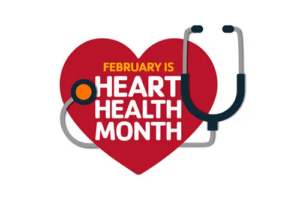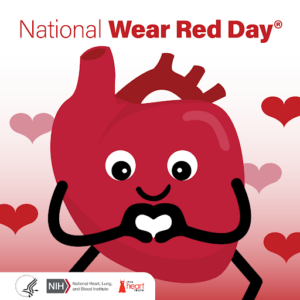February is American Heart Month! Tips for a Healthy Heart

February is American Heart Month! To help celebrate, we wanted to share a few tips on what you can do to live life with a healthy heart!

Heart disease is known to be the leading cause of death in the United States. In fact, heart disease is so common that February is dedicated to recognizing the importance of heart health. The month is focused on increasing awareness and education on what you can do to keep your heart healthy. So let’s educate ourselves…
- Heart disease “is the leading cause of death for men, women, and people of most racial and ethnic groups.” It’s not just men that have an increased risk for heart disease. It affects everyone!
- 1 in 5 female deaths is due to heart disease. It is so common that it inspired a campaign known as National Wear Red Day®. Each year on the first Friday of February, people all around the country “go red” to raise awareness for heart disease, especially for women. This year it will be recognized on February 7th, 2025.
- There are many different types of heart disease – for example, coronary artery disease, arrhythmia, cardiomyopathy, and more.
- Risk factors are wide-ranging for heart disease but include high blood pressure, age, sex, diet, obesity, sedentary lifestyle, smoking, genetics, etc. Not all risk factors are in your control, but some of them are and it is important to identify these factors to help improve your heart health.
Even though heart disease is so common. there are many things you can do to decrease your risk! Let’s learn about how to improve our heart health…
- Exercise: At Elite, we strongly believe in the importance of exercise and its many benefits to our health, and it’s not just us saying it! Exercise has many factors that are important, but let’s keep it simple. Exercise in any form is going to be helpful to your heart, but according to the American Heart Association the key is aerobic exercise. The key for aerobic exercise is to increase your heart rate. However, there are a few options that are better! 150 minutes a week of aerobic exercise (moderate-intensity) for adults is the gold
 standard for exercise. There are many ways to do moderate-intensity aerobic exercise, such as walking. We can also do vigorous exercise which includes running (75 minutes a week is recommended). There are many different ways to help your heart, but the key to making exercise stick is to find something you enjoy. It could be something like dancing or lifting weights. It may seem like a high amount to focus on, but no matter what, starting is the best option and best way to help your heart!
standard for exercise. There are many ways to do moderate-intensity aerobic exercise, such as walking. We can also do vigorous exercise which includes running (75 minutes a week is recommended). There are many different ways to help your heart, but the key to making exercise stick is to find something you enjoy. It could be something like dancing or lifting weights. It may seem like a high amount to focus on, but no matter what, starting is the best option and best way to help your heart! - Healthy Diet: A healthy diet means many things to different people! Here are a few tips for a “heart healthy diet.” First, increase your fresh fruits and vegetables (frozen is good, too)! Avoid anything that has syrups, lots of salt in canned goods, fried or cream sauce vegetables, etc. Second, whole grains! Try to limit or avoid refined grains found in items like white breads and increase items such as quinoa. Third, try to limit your intake of unhealthy fats. Focus on things like olive oil, avocados, and nuts to avoid butter, gravy, and bacon fat.
- Moderation is key: Moderation is truly key! Some things can be cut out completely from our lifestyle but when it comes to things like diet, moderation is best. For example, we cannot completely cut out fat. Some of us may enjoy butter, for example, but control/limit your intake with foods that increase your risk!
- Get Sleep: Sleep may not seem important to your heart but it is! Sleep allows your body to recover and heal so if you are not getting adequate sleep you are at risk for many diseases or other issues. Proper sleep helps keep your immune system strong, helps with brain function and memory, and decreases disease risk.
- Control what you can control: Several of the risk factors for heart disease are out of our control. Age and genetics are two great
 examples of factors that we cannot change. Luckily, most of the other risk factors can be changed. You can change diet, smoking, exercise, etc. even though it may not be easy! There are many factors that impact your ability to make lifestyle changes. So keep it simple: control the factors you can and when you can make a positive change, try to make it!
examples of factors that we cannot change. Luckily, most of the other risk factors can be changed. You can change diet, smoking, exercise, etc. even though it may not be easy! There are many factors that impact your ability to make lifestyle changes. So keep it simple: control the factors you can and when you can make a positive change, try to make it! - Educate yourself: This article is one small step to educating yourself on the importance of heart disease. It is also important to know your risk. Take note of how many of the risk factors mentioned in this article apply to you. Also talk to your doctor about heart disease, your risks, and what you should be doing to keep your heart healthy. Make sure to check out our citations below for more tips, tricks, and education!
- Seek medical attention (if needed): If you are concerned or are having symptoms of heart disease talk to your doctor about your symptoms. If you are having severe symptoms that are emergent call 911!
These are only a few tips and tricks to remember to keep your heart healthy. There are numerous resources to follow that can continue to help you educate yourself. The key to heart health is recognizing it is important and begin today to improve your lifestyle and heart!
Interested in adding more exercise to your life? Elite offers a variety of programs, from adult fitness training and sports performance training to physical therapy! We’re here to help so contact us if interested in learning more!
About the Author:
Katrina Abouzeid, BS is a Sports Performance Coach at Elite Sports Performance & Physical Therapy in Foxboro. Prior to joining Elite this past fall, she attended Lasell University and received her BS degree in Exercise Science. She is also a former athlete and intern at Elite and attended Norton High School. When she’s not coaching, you may see her at our front desk as our Patient Care Coordinator.
Citations:
American Heart Association. Life’s Essential 8. AHA. https://www.heart.org/en/healthy-living/healthy-lifestyle/lifes-essential-8
CDC: Centers for Disease Control and Prevention. About Women and Heart Disease. (2024). CDC. https://www.cdc.gov/heart-disease/about/women-and-heart-disease.html
CDC: Centers for Disease Control and Prevention. American Heart Month Communications Toolkit. (2024). CDC. https://www.cdc.gov/heart-disease/php/heart-month/index.html
CDC: Centers for Disease Control and Prevention. Heart Disease Risk Factors. (2024). CDC. https://www.cdc.gov/heart-disease/risk-factors/index.html
Mayo Clinic. Heart-healthy diet: 8 steps to prevent heart disease. (2024). Mayo Clinic. https://www.mayoclinic.org/diseases-conditions/heart-disease/in-depth/heart-healthy-diet/art-20047702
Meijers, W. C., & de Boer, R. A. (2019). Common risk factors for heart failure and cancer. Cardiovascular Research, 115(5), 844–853. https://doi.org/10.1093/cvr/cvz035
National Heart, Lung, and Blood Institute. (n.d.). American Heart Month. National Institutes of Health. https://www.nhlbi.nih.gov/education/american-heart-month
State of Illinois. (n.d.). February is Heart Health Awareness Month. Illinois Department of Central Management Services. https://cms.illinois.gov/benefits/stateemployee/bewell/awarenessmatters/february-is-heart-health-awareness-month.html
